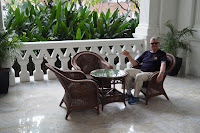 |
| Gardens by the Bay from the Skydeck of the Marina Bay Sands |
Land reclamation, which continues, has created the expansive Marina Bay development, the crowning jewel of which is Gardens by the Bay with its vast temperature-controlled conservatories and towering vertical gardens. The two conservatories house a stunning flower garden in one and a cloud forest with the world’s tallest indoor waterfall in the other.
 |
| Marina Bay Sands from Merlion Park |
Through the surrounding outdoor gardens it’s hard not to gawk at the Marina Bay Sands, a Las Vegas style hotel comprising three large towers joined at the top with an expansive deck on the 58th floor open for public viewing and above that, space for hotel guests which includes an infinity pool.
The complex designed by the renowned architect Moshe Safdie resembles a set of massive cricket stumps and bails. Mr. Safdie also designed Vancouver’s unusual public library, British Columbia’s very own Coliseum.
The view from the “sky deck” is impressive but below at
ground level the hotel lobby was not altogether welcoming with a confused scene
of humanity swarming this way and that, not unlike a busy airport terminal.
 |
| Waiting as Rosslea checks us in, coffee on the way |
 |
| Raffles by night |
 |
| The elegant lobby |
 |
| Me and Mr. Singh |
 |
| Doug with the younger Mr. Singh |
 |
| What's missing from this picture? |
As our car crunched its way over the immaculate gravel driveway coming to a halt outside the hotel’s front door, Mr. Singh greeted us with a huge smile, gleaming eyes and booming voice.
He has been there for years and we did remember him from our last visit when we visited the hotel's Long Bar to sample the famed (and highly overrated) Singapore Sling.
Rosslea, one of the hotel concierges latched on to us as soon as we walked in the door, anticipating everything we could possibly ask for. Its always about the people and the welcome we received and service throughout our stay was absolutely first class.
Walking to our Palm Court suite, the dark wooden walkways
squeaked a little underfoot. Exotic
rattan chairs rested against the while plaster columns and railings that
overlook the tropical gardens below with swaying palms and chuckling
birds. We felt as though we had been transported
back to colonial times, it felt like another world.
Once we had come back down to earth, we ventured out on Singapore’s
immaculate MTR arriving at Fort Canning for a guided tour of the Battlebox and
Fort Canning Hill. The Battlebox was the
underground command centre of Malaya Command, the army that defended Singapore
in World War Two. The decision to
surrender Singapore to the Japanese in 1942 marked the beginning of the end of
the British Empire and the start of the darkest chapter of Singapore’s modern
history. It was hard not to be moved by
the events and eventual outcomes.



 On to happier things, we revisited the Botanical Gardens,
viewing a tree that transformed the region – Hevea Brasiliensis – the rubber tree. Its seeds had been smuggled out of Brazil by
the British who experimented with them at Kew Gardens, later introducing
seedlings to the Malayan peninsula where they flourished.
On to happier things, we revisited the Botanical Gardens,
viewing a tree that transformed the region – Hevea Brasiliensis – the rubber tree. Its seeds had been smuggled out of Brazil by
the British who experimented with them at Kew Gardens, later introducing
seedlings to the Malayan peninsula where they flourished.
The “must see” at the Botanical Gardens is the National
Orchid Garden which showcases the largest number of orchids in the world. Stunningly beautiful, their shapes and
colours a treat to see.
In another part of town, the Peranakan shop houses with their brightly painted doors, shutters and inlaid tile were another draw. The Peranakan people were the result of trade that lured travellers from China, Indonesia and India to Malacca. Many merchants put down roots, marrying local women. Their descendants became the Peranakan.
In another part of town, the Peranakan shop houses with their brightly painted doors, shutters and inlaid tile were another draw. The Peranakan people were the result of trade that lured travellers from China, Indonesia and India to Malacca. Many merchants put down roots, marrying local women. Their descendants became the Peranakan.

 The Peranakan Museum is well curated with exhibits
showcasing rituals, language, food, fashion and handicrafts. The embroidery and beadwork particularly
fabulous.
The Peranakan Museum is well curated with exhibits
showcasing rituals, language, food, fashion and handicrafts. The embroidery and beadwork particularly
fabulous. The display of kebayas was lovely. The kebaya is an embroidered blouse held together with a series of three ornate brooches and has been adapted as part of Singapore Airlines' cabin uniform.
What is old is new again in Singapore. Its greening has produced a city within a
garden as opposed to gardens within a city.
In spite of Singapore’s constant development and change it really was
nice to see Mr. Singh again.
No comments:
Post a Comment